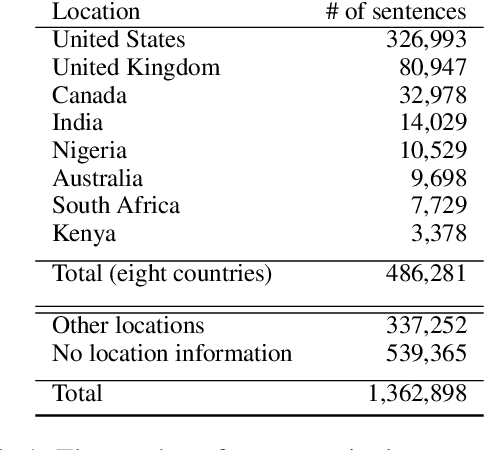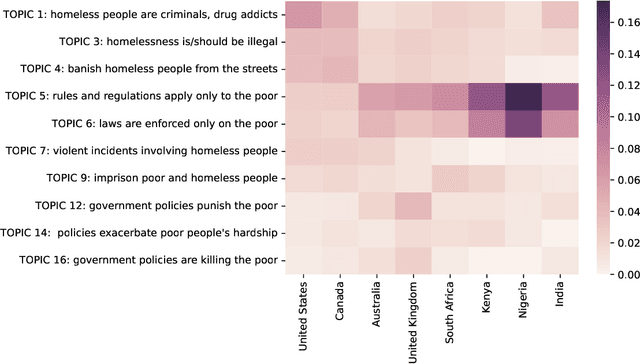Georgina Curto
What Would an LLM Do? Evaluating Policymaking Capabilities of Large Language Models
Sep 04, 2025Abstract:Large language models (LLMs) are increasingly being adopted in high-stakes domains. Their capacity to process vast amounts of unstructured data, explore flexible scenarios, and handle a diversity of contextual factors can make them uniquely suited to provide new insights for the complexity of social policymaking. This article evaluates whether LLMs' are aligned with domain experts (and among themselves) to inform social policymaking on the subject of homelessness alleviation - a challenge affecting over 150 million people worldwide. We develop a novel benchmark comprised of decision scenarios with policy choices across four geographies (South Bend, USA; Barcelona, Spain; Johannesburg, South Africa; Macau SAR, China). The policies in scope are grounded in the conceptual framework of the Capability Approach for human development. We also present an automated pipeline that connects the benchmarked policies to an agent-based model, and we explore the social impact of the recommended policies through simulated social scenarios. The paper results reveal promising potential to leverage LLMs for social policy making. If responsible guardrails and contextual calibrations are introduced in collaboration with local domain experts, LLMs can provide humans with valuable insights, in the form of alternative policies at scale.
Tackling Social Bias against the Poor: A Dataset and Taxonomy on Aporophobia
Apr 17, 2025Abstract:Eradicating poverty is the first goal in the United Nations Sustainable Development Goals. However, aporophobia -- the societal bias against people living in poverty -- constitutes a major obstacle to designing, approving and implementing poverty-mitigation policies. This work presents an initial step towards operationalizing the concept of aporophobia to identify and track harmful beliefs and discriminative actions against poor people on social media. In close collaboration with non-profits and governmental organizations, we conduct data collection and exploration. Then we manually annotate a corpus of English tweets from five world regions for the presence of (1) direct expressions of aporophobia, and (2) statements referring to or criticizing aporophobic views or actions of others, to comprehensively characterize the social media discourse related to bias and discrimination against the poor. Based on the annotated data, we devise a taxonomy of categories of aporophobic attitudes and actions expressed through speech on social media. Finally, we train several classifiers and identify the main challenges for automatic detection of aporophobia in social networks. This work paves the way towards identifying, tracking, and mitigating aporophobic views on social media at scale.
Can Poverty Be Reduced by Acting on Discrimination? An Agent-based Model for Policy Making
Mar 03, 2024Abstract:In the last decades, there has been a deceleration in the rates of poverty reduction, suggesting that traditional redistributive approaches to poverty mitigation could be losing effectiveness, and alternative insights to advance the number one UN Sustainable Development Goal are required. The criminalization of poor people has been denounced by several NGOs, and an increasing number of voices suggest that discrimination against the poor (a phenomenon known as \emph{aporophobia}) could be an impediment to mitigating poverty. In this paper, we present the novel Aporophobia Agent-Based Model (AABM) to provide evidence of the correlation between aporophobia and poverty computationally. We present our use case built with real-world demographic data and poverty-mitigation public policies (either enforced or under parliamentary discussion) for the city of Barcelona. We classify policies as discriminatory or non-discriminatory against the poor, with the support of specialized NGOs, and we observe the results in the AABM in terms of the impact on wealth inequality. The simulation provides evidence of the relationship between aporophobia and the increase of wealth inequality levels, paving the way for a new generation of poverty reduction policies that act on discrimination and tackle poverty as a societal problem (not only a problem of the poor).
Algorithms for Social Justice: Affirmative Action in Social Networks
May 05, 2023Abstract:Link recommendation algorithms contribute to shaping human relations of billions of users worldwide in social networks. To maximize relevance, they typically propose connecting users that are similar to each other. This has been found to create information silos, exacerbating the isolation suffered by vulnerable salient groups and perpetuating societal stereotypes. To mitigate these limitations, a significant body of work has been devoted to the implementation of fair link recommendation methods. However, most approaches do not question the ultimate goal of link recommendation algorithms, namely the monetization of users' engagement in intricate business models of data trade. This paper advocates for a diversification of players and purposes of social network platforms, aligned with the pursue of social justice. To illustrate this conceptual goal, we present ERA-Link, a novel link recommendation algorithm based on spectral graph theory that counteracts the systemic societal discrimination suffered by vulnerable groups by explicitly implementing affirmative action. We propose four principled evaluation measures, derived from effective resistance, to quantitatively analyze the behavior of the proposed method and compare it to three alternative approaches. Experiments with synthetic and real-world networks illustrate how ERA-Link generates better outcomes according to all evaluation measures, not only for the vulnerable group but for the whole network. In other words, ERA-Link recommends connections that mitigate the structural discrimination of a vulnerable group, improves social cohesion and increases the social capital of all network users. Furthermore, by promoting the access to a diversity of users, ERA-Link facilitates innovation opportunities.
The crime of being poor
Mar 24, 2023



Abstract:The criminalization of poverty has been widely denounced as a collective bias against the most vulnerable. NGOs and international organizations claim that the poor are blamed for their situation, are more often associated with criminal offenses than the wealthy strata of society and even incur criminal offenses simply as a result of being poor. While no evidence has been found in the literature that correlates poverty and overall criminality rates, this paper offers evidence of a collective belief that associates both concepts. This brief report measures the societal bias that correlates criminality with the poor, as compared to the rich, by using Natural Language Processing (NLP) techniques in Twitter. The paper quantifies the level of crime-poverty bias in a panel of eight different English-speaking countries. The regional differences in the association between crime and poverty cannot be justified based on different levels of inequality or unemployment, which the literature correlates to property crimes. The variation in the observed rates of crime-poverty bias for different geographic locations could be influenced by cultural factors and the tendency to overestimate the equality of opportunities and social mobility in specific countries. These results have consequences for policy-making and open a new path of research for poverty mitigation with the focus not only on the poor but on society as a whole. Acting on the collective bias against the poor would facilitate the approval of poverty reduction policies, as well as the restoration of the dignity of the persons affected.
 Add to Chrome
Add to Chrome Add to Firefox
Add to Firefox Add to Edge
Add to Edge